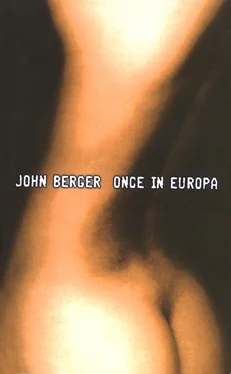John Berger - Once in Europa
Здесь есть возможность читать онлайн «John Berger - Once in Europa» весь текст электронной книги совершенно бесплатно (целиком полную версию без сокращений). В некоторых случаях можно слушать аудио, скачать через торрент в формате fb2 и присутствует краткое содержание. Год выпуска: 2014, Издательство: Bloomsbury Publishing, Жанр: Современная проза, на английском языке. Описание произведения, (предисловие) а так же отзывы посетителей доступны на портале библиотеки ЛибКат.
- Название:Once in Europa
- Автор:
- Издательство:Bloomsbury Publishing
- Жанр:
- Год:2014
- ISBN:нет данных
- Рейтинг книги:3 / 5. Голосов: 1
-
Избранное:Добавить в избранное
- Отзывы:
-
Ваша оценка:
- 60
- 1
- 2
- 3
- 4
- 5
Once in Europa: краткое содержание, описание и аннотация
Предлагаем к чтению аннотацию, описание, краткое содержание или предисловие (зависит от того, что написал сам автор книги «Once in Europa»). Если вы не нашли необходимую информацию о книге — напишите в комментариях, мы постараемся отыскать её.
Once in Europa — читать онлайн бесплатно полную книгу (весь текст) целиком
Ниже представлен текст книги, разбитый по страницам. Система сохранения места последней прочитанной страницы, позволяет с удобством читать онлайн бесплатно книгу «Once in Europa», без необходимости каждый раз заново искать на чём Вы остановились. Поставьте закладку, и сможете в любой момент перейти на страницу, на которой закончили чтение.
Интервал:
Закладка:
Stupidly, helplessly and for no good reason, I began to snivel. Michel turned round and started the engine. He could drive the car, for it had been adapted and fitted out with hand-controls. His two feet in their polished shoes just rested on the floor. Like flatirons.
When there’s no choice, Michel said over his shoulder, it’s extraordinary what you can adapt to.
I know.
At first I was too drugged to realise, he said, then bit by bit the truth came home to me. When I woke up in the morning and remembered what I was, I wanted to scream. For a week I was in despair. Why me? I kept on asking. Why me?
I know, I said. You’d gone to sleep. We were driving along by the river. He controlled the speed with his scarred right hand. His two feet lay on the floor like flatirons. I was still sniffling.
The great thing in hospital is you aren’t alone. There are other people in the same state as you, he said, some are worse off than you. You’ve only got one life, they say, so better make the most of it. It’s not true, Odile.
I know, I said between tears.
We were all bad cases. Third-degree burns, with fifty, sixty, seventy percent disability. We’d have all been dead twenty years ago. There were people — we heard it — there were people who said we’d be better off dead. We had to learn to live a second life. The first one was over forever and ever. He’s sleeping now?
He’s asleep, yes, I whispered.
I had to learn how to live — and it wasn’t like learning for the second time, that’s what’s so strange, Odile, it was like learning for the first time. Now I’m beginning my second life.
Do you have much pain? I asked.
Not much.
Never?
Not much. Sometimes when it’s hot in the summer I’m uncomfortable. He touched the top of his thigh. Otherwise, no. For a long while I dreamt of pain in my legs. They weren’t amputated in my dreams. I’ll tell you something else, Odile. I’ve become a fire-cutter.
I started to laugh. As with my tears, I didn’t know why.
There was an old man in the hospital. He wasn’t a patient and he wasn’t a member of the staff… he was there every day. He went out to buy whatever we asked him — papers, fruit, tobacco, eau de cologne — and in return we gave him the change. He was eighty-two. When he was younger he’d been a railwayman. He was a fire-cutter. I saw him take the pain away once. A nurse scalded her hands with boiling water, and the old man put a stop to her suffering in two minutes. According to him he was getting too old, said the effort of cutting the fire took too much out of him. So, one day he announced he’d been watching us all very carefully and now he’d decided, now he’d chosen his successor. And it was to be me. He gave me his gift.
How?
Like that.
What did he do?
He just gave me his gift.
We were in Cluses and Michel drove us to the front door. You were already asleep in my arms. Despite my protests he insisted on getting out of the car. He moved his legs with his arms. He pulled himself up with his arms. His neck and shoulders were much thicker than they had been. He extracted himself like a man climbing out of a trench he’s dug. There he stood on the pavement, swaying slightly from his hips.
If you ever need me, you know where to find me now. I was so sorry, he repeated again, to hear what had happened.
Do you remember Stepan? I asked him.
I remember him. He was very tall, with blond hair. Didn’t he have blue eyes? We worked a couple of nights in the same gang, two or three nights I think — before I collected this packet. He slapped his hip.
I don’t even have a picture of him, I said.
You don’t need a photo, he said, fingering your woolen bonnet, you have his progeny.
Strange word, progeny!
You can’t have closer, he said. Good night.
The long years began, the long years of your boyhood. Do you remember the flat we lived in? You did your homework on the kitchen table. You were always wanting me to make potato pancakes for supper. You kept a soccer ball in a net hung from the ceiling over your bed. Your room smelt of glue because of the models you made. The same smell as my nail varnish. You could change washers on a tap before you were ten. In my room there was the oak bed with the carved roses, when you were ill you slept in it with me and sometimes on Sundays too. Remember when we painted the living room and you fell off the ladder? You were all I had in the world and I thought you were dead.
Why do I have the same name as you, Maman, why am I called Christian Blanc?
Because your father died before you were born.
What was he like?
Strong.
What did he look like?
Big.
Was he like me?
Yes.
Was he interested in aircraft?
Not particularly, I think.
You don’t know much about him, do you?
As much as anyone ever knows.
Guess what I really want to do, Maman. I want to build a glider. One that will fly. I saw a picture in a book at school. It’ll have to be big, as big as a car.
Big enough to fly us round the world?
Yes … I’ll need lots of glue.
The long years began. Where could we go to be at home? Régis got married to Marie-Jeanne. Her condition for marrying him was that he give up drinking, and for a while he did. Mother sold the last cow, keeping only the goats and chickens. The trees of the forest, up by the path to Le Mont, began to die. The hillside above the river became the grey rusty colour of dead wood. Emile got a job loading drums in a paint factory near the frontier and Mother lavished all her attention upon him. Every evening he came home to a hero’s welcome. His weaknesses inspired her determination to live to be a hundred. As she aged, Emile became the love of her life. She changed the hay of his mattress every week.
I bought an atlas to study how to go to Stockholm. I found the Ukraine and the river Pripiat. Yet what could we have done there? We’d have been further from home than ever.
Why are we going up so fast now?
The boss at the Components Factory pursued us for a while. You remember he bought you a Sputnik with a dog inside, and you lost the dog? I went to his house for supper several times. He took us to the lake and we ate a fish like a trout but stronger tasting. You said fish find their way in the ocean through their sense of smell. His wife had left him years before. He was nearly forty, you were nine.
Do you want to marry Gaston, Maman?
We are still climbing into the sky.
No, I don’t want to marry him.
I think he wants to marry you.
I don’t know.
He told me he’s going to buy a Citroën DS.
That’s what interests you, isn’t it?
If you didn’t have to work for him, Maman, I think I’d like him more.
Gaston is very kind. He and I don’t know the same things, that’s all. What he knows doesn’t interest me a lot and what I know would frighten him.
You couldn’t frighten me, Maman.
When we turn, Christian, it’s strange, for there I am looking not up but down at the blue sky.
Michel’s shop in Pouilly was unlike any other in the district. The newspapers were arranged in a special way, the left-wing ones always in front. When a customer asked for Le Figaro , Michel bent down and brought one up from under the counter with a look of disgust, as if the paper the man had demanded were wrapped round a rotten fish. He sold bottles of gnôle with a pear the size of my fist inside the bottle.
How did the pear get inside? you asked.
It grew from a pip! Michel said and you didn’t know whether to believe him or not.
He also sold toboggans and radios. He was mad about radios and could repair anything. On the back wall of the shop he pinned a large map of the world and on each country he stuck little labels like the ones they sell for jam pots, indicating the city, the wavelength, the hours of broadcasting. There were those who said that Michel with his politics and his radios could only be a spy for the Russians! His reputation as a fire-cutter spread. People from other valleys came to him to have the pain of their burns taken away. He categorically refused any payment. It’s a gift! he repeated.
Читать дальшеИнтервал:
Закладка:
Похожие книги на «Once in Europa»
Представляем Вашему вниманию похожие книги на «Once in Europa» списком для выбора. Мы отобрали схожую по названию и смыслу литературу в надежде предоставить читателям больше вариантов отыскать новые, интересные, ещё непрочитанные произведения.
Обсуждение, отзывы о книге «Once in Europa» и просто собственные мнения читателей. Оставьте ваши комментарии, напишите, что Вы думаете о произведении, его смысле или главных героях. Укажите что конкретно понравилось, а что нет, и почему Вы так считаете.












